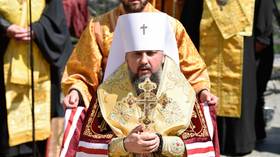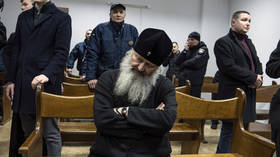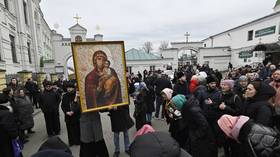Ukrainian church to ban prayers in Russian

Prayers in Kiev’s iconic Pechersk Lavra should be said in Ukrainian from now on, the head of the recently formed Orthodox Church of Ukraine (OCU) said on Sunday. The historic monastery was occupied by monks belonging to the canonical Ukrainian Orthodox Church (UOC) until recently.
The monastery recently found itself at the center of a standoff between the UOC and the Ukrainian government. The Kiev-backed church now plans to hold prayers at the Lavra during the Orthodox Easter holidays, which are due to be celebrated next week.
The head of the OCU, Metropolitan Epiphany, told the Ukrainian media that he would hold prayers in the monastery on Orthodox Easter next Sunday. Kiev registered the Lavra as an OCU monastery as long ago as December 2, 2022, on the day that President Vladimir Zelensky banned all religious organizations “affiliated” with Russia from operating in Ukraine.
The UOC monks continued to live in the monastery until recently. In late March, a lease contract between the Ukrainian authorities and the UOC, which had allowed the monks to live in the Lavra, was terminated by Kiev. The monks refused to leave and filed a complaint appealing the decision to a Kiev court. Their case is now scheduled to be heard later in April.
The OCU does not want to “evict the monks,” Epiphany told the Ukrainian media. “We want the spirit of the ‘Russian world’ to no longer reign here,” he added, while insisting that “the Lavra should be Ukrainian; prayers in Ukrainian and for Ukraine should always be held there.”
He also claimed that the OCU was already regularly holding prayers in the upper part of the monastery vacated by the UOC monks, and would pray “peacefully and calmly” in the Lower Lavra that is still occupied by them as well. The OCU Metropolitan insisted that the “Ukrainization” of the monastery is “inevitable.”
Tensions between the monastery and the Ukrainian authorities escalated back in November 2022, when the Ukrainian security service (SBU) opened a criminal case over chants glorifying Russia in the Lavra amid the ongoing conflict between Kiev and Moscow.
The UOC has historical ties with the Russian Orthodox Church and was accused by Ukrainian officials of being a security threat amid the military conflict with Russia. The SBU has been raiding UOC churches, ostensibly searching for weapon stockpiles and evidence of treason.
In late March, Ukrainian law enforcement arrested Metropolitan Pavel, a senior bishop of the UOC, who was the leader of the monks in the Larva. The SBU accused him of inciting religious hatred and “justifying and denying Russian military aggression.”
Moscow demanded Pavel’s release while accusing Zelensky’s government of religious persecution. A report by the UN Office of the High Commissioner for Human Rights (OHCHR) also said last month that the actions of the Ukrainian government “could be discriminatory,” prompting a rebuke from Kiev.














